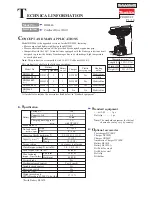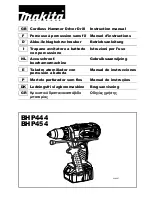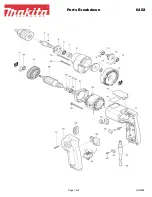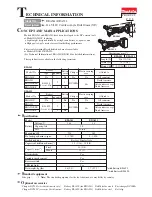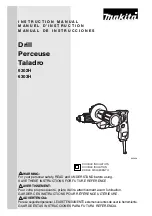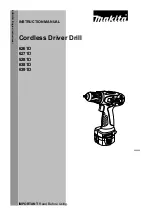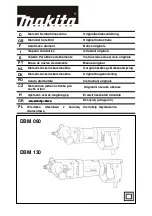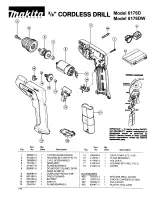
Ridge Tool Company
Tools For The Professional
TM
RB-208/3 & RB-214/3
WARNING! Read these instructions and
the accompanying safety booklet care
fully before using this equipment. If you
are uncertain about any aspect of using this tool,
contact your RIDGID distributor for more infor
mation.
Failure to understand and follow all instructions
may result in electric shock, fire, and/or serious
personal injury.
SAVE THESE INSTRUCTIONS!
SAFETY INSTRUCTIONS
Warning:
When using electric tools, basic safety precautions should
always be followed to reduce the risk of fire, electric shock, and personal
injury including the following:
1.
Know your Core Drilling Machine.
Read Operator ’s Manual
carefully.
2.
Servicing.
Other than routine maintenance should be performed by an
authorized service representative.
3.
Accessories; replacement parts.
When servicing use only identical
replacement parts.
Use recommended accessories.
4.
Keep work area clean.
Avoid cluttered work areas.
5.
Consider work area environment.
- Don ’t expose power tools to rain.
- Mop up all excessive water around the work area before
proceeding.
- Keep work areas well lit.
6.
Use extreme caution when drilling through floors.
Provide for protection of all personnel and material below the area.
7.
Keep visitors away.
8.
Don’t force tool.
Drill should be used at a speed and feed rate that
does no overload the motor.
9.
Dress properly.
- Do not wear loose clothing or jewelry. They can be caught in
moving parts.
- Rubber gloves and non-skid footwear are recommended when
working outside.
- Wear protective hair covering to contain long hair.
10.
Use safety glasses.
11.
Don’t abuse cord.
Never carry tool by cord or yank it to disconnect
from receptacle. Keep cord from heat, oil and sharp edges.
12.
Secure Drill Stand.
Use bolts, ceiling jack, or vacuum hold-down.
Do not secure Drill Stand with a vacuum hold-down when drilling on
vertical surfaces such as walls.
13.
Don’t overreach.
Keep proper footing and balance at all times.
14.
Maintain tools with care.
- Keep tools clean for optimum performance.
- Follow instructions for lubricating and changing accessories.
- Inspect Machine and extension cords periodically and if damaged,
have repaired by authorized service facility.
- Keep handles dry, clean and free from oil and grease.
15.
Disconnect power when not in use,
before servicing, and when
changing accessories or Bits.
16.
Form a habit of checking
to see if wrenches are removed from tool
before turning it on.
17.
Avoid accidental starting.
Make sure ON/OFF Switches are in OFF
position before plugging in Power Cord.
18.
When releasing Carriage Locking Handle,
maintain a firm grip on
Feed Handle to prevent Feed Handle from revolving due to weight of
Drill.
SET UP INSTRUCTIONS FOR SECURING MACHINE
Caution: It is very important that the Drilling Machine is properly
secured to the work surface. Movement during drilling will cause
chatter of Bit against the work surface, fracturing diamonds.
Bit may also bind in hole causing damage to the Bit. The methods for
anchoring are as follows:
Bolt Anchor Method-to-Floor
1. Mark the position where Anchor Bolt hole will be drilled.
2. Drill and set Anchor Bolt. Place Drilling Machine over anchor hole and
hand tighten bolt (Fig. 1).
3. Adjust 4 Leveling Screws (Fig. 2A) to stabilize Base and plumb Mast.
Secure Machine by tightening Anchor bolt.
Vacuum Anchor Method-to-Floor
The Anchor Vacuum Method is NOT recommended on rough or cracked
floor conditions, holes deeper than one bit length, or steel concentration
greater than standard rebar.
RB-208/3
1. Turn Machine on its back and insert Vacuum Seal (Fig. 3) under
Machine Base.
2. Turn drilling Machine upright and loosen 4 Base Leveling Screws.
3. Check vacuum and hose connections (Fig. 4, 6), then switch on
vacuum pump.
4. The Drilling Machine should now be vacuum anchored. If Machine
does not anchor, add weight by standing on Vacuum Base. It should
now anchor with Vacuum Gauge reading 20 inches of mercury
minimum. If not, check the floor and Vacuum Seal for leaks.
5. Adjust 4 Leveling Screws to stabilize machine and plumb Mast. The
Machine is now ready to drill.
Note:
Vacuum can be released by turning Vacuum Release Valve.
RB-214/3
1. Put vacuum plate under the base plate (Fig. 7).
2. Check vacuum and hose connections, then switch on vacuum pump
(Fig. 4, 6).
3. The drilling machine should now be vacuum anchored. If machine
does not anchor, add weight by standing on vacuum base.It should
anchor now with vacuum gauge reading 20 inches of mercury
minimum. If not, check the floor and vacuum seals for leaks.
Note:
- It is not recommended to use vacuum anchoring for drilling holes
260 mm and more in reinforced concrete.
- Vacuum can be released by turning vacuum release valve (Fig. 6).
Ceiling jack anchor method (Fig. 8)
1. For the RB-208/3 and RB-214/3 fit the quick fixing device between the
ceiling and the ceiling jack on top of mast.Tighten ceiling jack screw to
force machine against floor. Stabilize and plumb machine by adjusting
4 leveling screws.
Angle Drilling (RB-208/3, RB-214/3)
Anchor unit as described above. Secure mast at required angle and drill
hole.
Note:
More care is required as the vibration will be higher when starting to
drill at an angle.
GB
RB-208/3, RB-214/3
Operating Instructions


















